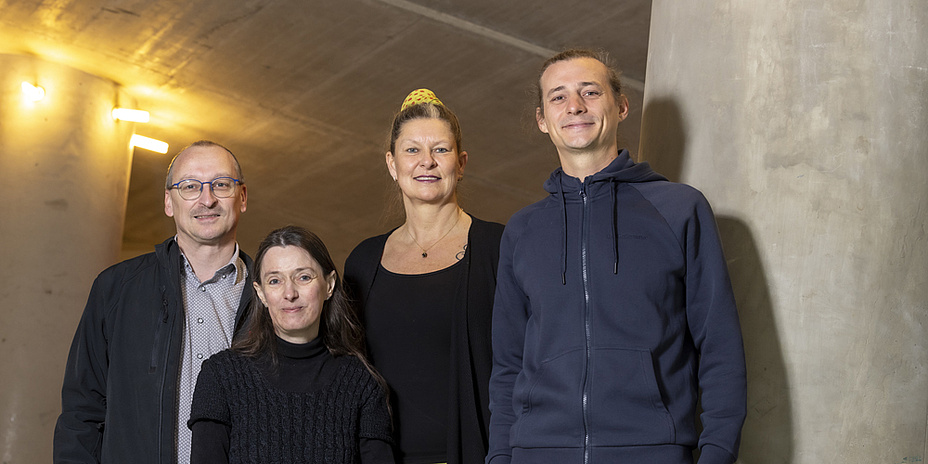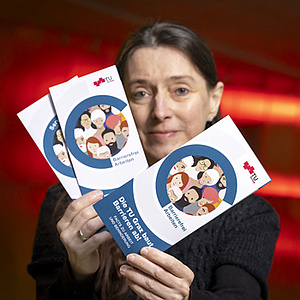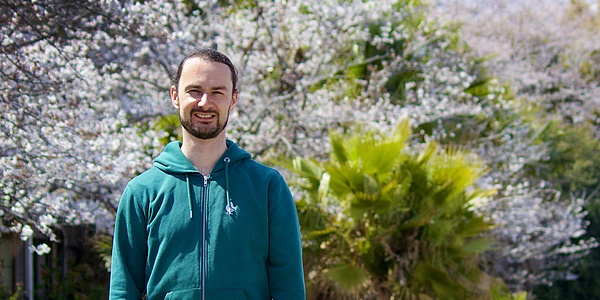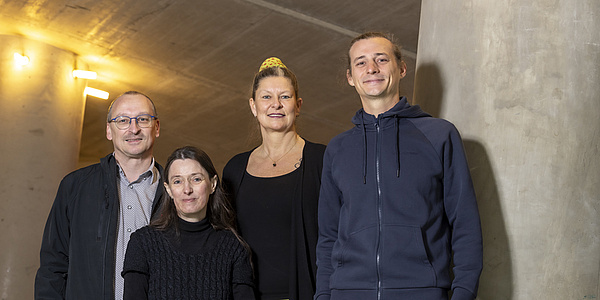Breaking Down Barriers Together

When people think about working people with disabilities, many people first think of a colleague in a wheelchair or a colleague with a mobility cane for vision impairment. But Andreas Gößler can tell you a thing or two about this: “You know lots of colleagues with a disability but you don’t know that you know them.” This is because most disabilities are not visible at first glance, such as mental or chronic illnesses like depressive illnesses or diabetes. The counselling services offered by the Representative for People with Disabilities and the Service Point for Accessible Working at the TU Graz are also very individual.
Andreas Gößler joined TU Graz in 1991 as a technical drawing apprentice and has now been head of the Purchasing Service OU for ten years. At the same time, he is an elected representative for people with disabilities at TU Graz and has been for so long that he can no longer say exactly when he first took on this honorary position. He fulfils this role together with his deputy Daniela Agrinz, who works as a secretary at the Institute of Biomedical Imaging. Daniela Agrinz also completed an apprenticeship in technical drawing at TU Graz and has been working at the University since 1988. She is also a member of the works council for administrative personnel. All representatives for people with disabilities belong to the group of persons registered as disabled.
The team at the Service Point for Accessible Working at TU Graz, which was founded in February 2023, has been working closely with these two persons for a year now. Thomas Wallner is a trained social counsellor with a degree in education and educational sciences. He joined TU Graz in 2022 and initially worked at the Service Point for Accessible Learning. Elisabeth Lenz has been his colleague at the Service Point for Accessible Working since autumn. With a doctorate in social education, she has also trained as a life and social counsellor and is herself a member of the group of people registered as disabled.
First point of contact for employees with a disability
The Representatives for People with Disabilities and the Service Point for Accessible Working serve as the first point of contact for employees with a disability, mental and/or chronic illnesses – they can contact any team member in confidence. Together, Andreas Gößler, Daniela Agrinz, Thomas Wallner and Elisabeth Lenz provide support with filling out applications, advising on funding opportunities and providing information on accessible working. A key issue here is the status of a person registered as disabled, which brings with it a number of advantages in working life.
At TU Graz, we know of around 50 employees who are registered as disabled. They benefit from individual support measures (e.g. technical aids or personal assistance in the workplace), protection of pay and against discrimination and increased protection against dismissal, tax benefits and additional leave. However, many more colleagues could actually belong to the group of people registered as disabled. Every person with a degree of disability of at least 50 per cent has the opportunity to apply for this status from the Ministry of Social Affairs and to have this status withdrawn if they so wish. Employees who are registered as disabled can also take part in the election of the representative for people with disabilities.
Events and information for all employees
The services offered by the Service Point for Accessible Working are aimed not only at employees with a disability, but also at anyone interested in the topic of inclusion in the workplace. In recent months, a series of events have been organised to inform interested parties about the topic and raise awareness among employees. Whether it was a biscuit stand in winter for people to get to know each other in a friendly atmosphere or a book presentation on the topic of “Working unhandicapped”, the events were well attended. “This is a real burning issue,” says Thomas Wallner. From March 2024, the Service Point for Accessible Working will be hosting a monthly series of lectures on topics such as mobility restrictions and cancer. TU Graz employees will be informed of all dates in good time.
Andreas Gößler reports that colleagues with a disability generally have positive experiences of talking openly about their disabilities with their superiors and in their team: “If managers are aware of this, they can act accordingly and allocate work appropriately. And openness ensures acceptance among colleagues, for example if someone needs regular breaks for insulin injections.”

No one-size-fits-all solution
Andreas Gößler and Thomas Wallner agree that the issue of accessibility is discussed very openly at TU Graz and is a key concern of the Rectorate. However, it is not so easy to ensure complete accessibility, as Thomas Wallner points out: “There is no one-size-fits-all solution, because every person is unique.” If barriers are removed for one group, this can create new barriers for other people – for example, particularly bright light in the workplace can be helpful for people with a visual impairment, but at the same time disturbing for others. Andreas Gößler emphasises that a disability says nothing about how well a person does their job. Thomas Wallner adds: “We have to work together as a society to break down barriers – it is not the job of one person to adapt.”
Our university also aims to achieve this in the Affirmative Action Plan of the Statutes: “TU Graz is committed to supporting equal opportunities for people with disabilities, mental, physical, and/or chronic illnesses and creates framework conditions that enable equal participation in all teaching, research and administrative activities.” One of TU Graz’s goals is to employ even more people with a disability and people who are registered as disabled.
Support for students
In addition to similar services for employees at TU Graz, the Service Point for Accessible Learning has been supporting students with disabilities, impairments and/or illnesses since 2012. In addition, GESTU-Graz – a service point for deaf and hard of hearing students at all universities in Graz – was founded at TU Graz in January 2022. “We are in constant touch with our colleagues from the Service Point for Accessible Learning and GESTU-Graz. Barriers to studying are also an important topic for lecturers, who should address them,” explains Thomas Wallner. To help teachers, TU4U provides a guide to inclusive teaching at TU Graz (available in German and English) as well as a guide to creating accessible documents: Accessible Learning – Information for Staff.
Kontakt
Service Point for Accessible Working
Mandellstraße 9, 1st Floor
8010 Graz
barrierefrei-arbeiten@tugraz.at




